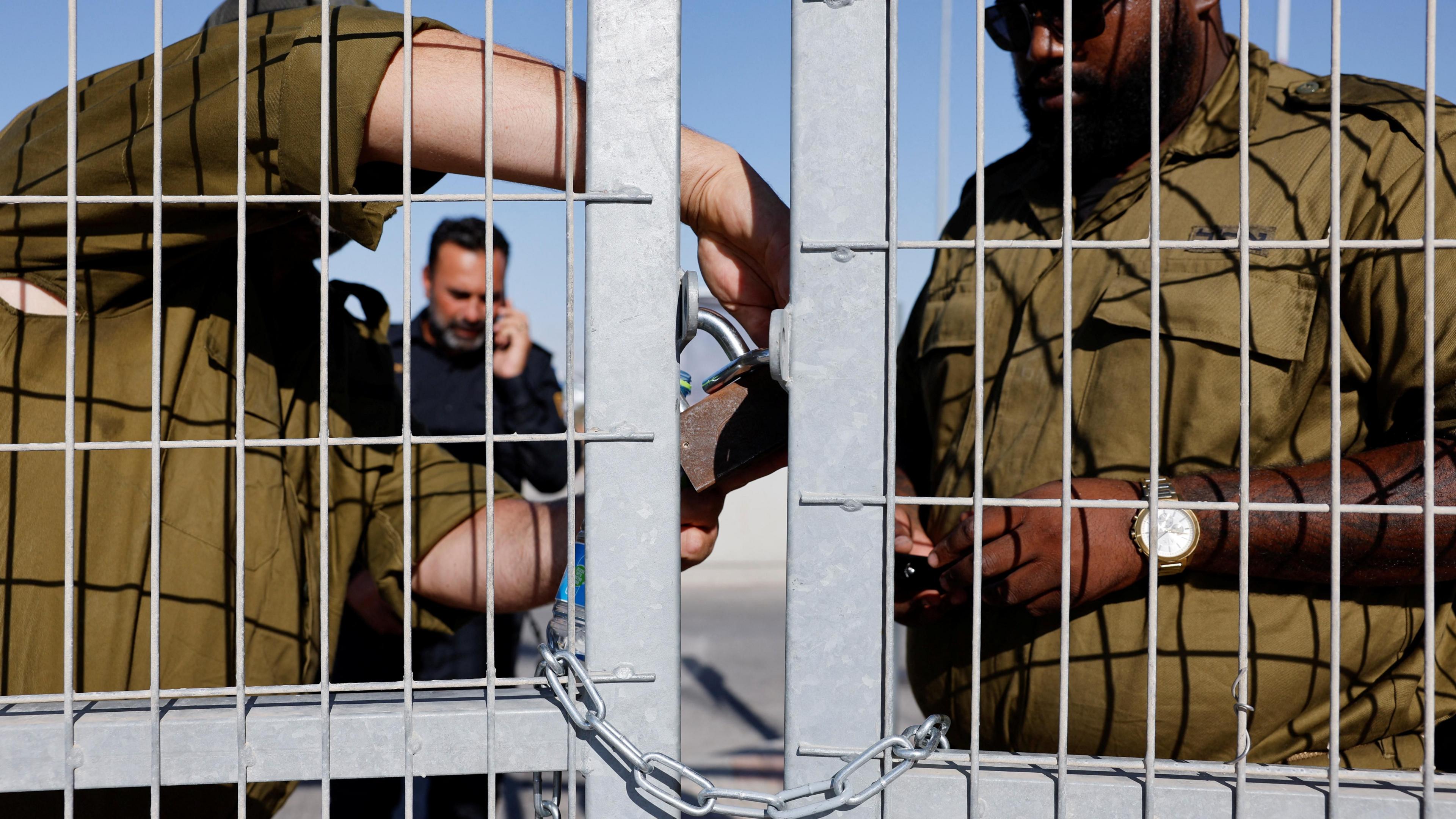Israel may have tortured Palestinian prisoners - UN

Israeli authorities have said they are investigating allegations of abuse at the Sde Teiman detention facility
- Published
The United Nations human rights office says Palestinians detained by Israel since the outbreak of the war in Gaza may have been tortured.
The UN report gathered testimony from men, women and children who had been detained, who said "they were held in cage-like facilities, stripped naked for prolonged periods, wearing only diapers".
UN High Commissioner for Human Rights Volker Türk said testimony received by his office suggested Israeli authorities may have inflicted "appalling acts" on detainees, including "waterboarding and the release of dogs".
Many have been held without without charge, access to a lawyer, and in "deplorable conditions," the report adds.
The report also documents the suffering Israeli hostages say they endured while held by Hamas. Former hostages said they were deprived of adequate food and water in captivity, with some also saying they were beaten.
Gazans ‘shackled and blindfolded’ at Israel hospital
- Published21 May 2024
Israeli protesters enter army base after soldiers held over Gaza detainee abuse
- Published30 July 2024
Israel, Hamas accused of war crimes in new UN report
- Published12 June 2024
Bruises and broken ribs – Palestinian deaths in Israeli prisons
- Published23 April 2024
Israeli forces have detained thousands of Palestinians over the course of the war in Gaza - mostly from Gaza but also from the occupied West Bank and Israel itself.
Human rights defenders have raised concerns about the detention facilities some detainees are being held in, with both Israeli whistleblowers and released detainees alleging widespread mistreatment of Palestinian prisoners.
The International Committee of the Red Cross (ICRC) says it has been refused permission to visit facilities where Palestinian prisoners are being held.
In July Israeli authorities said they were investigating reports of abuse in detention centres, but gave no details.
Responding to previous allegations, Israel said violence against detainees was “absolutely prohibited” and that it regularly briefed its forces on the conduct required of them.
Earlier this week, Israeli military police detained reservists accused of severely mistreating a Palestinian prisoner in the Sde Teiman jail in southern Israel. The US state department has also previously expressed concern about allegations of ill-treatment.
But today’s UN report contains the most extensive accounts, from former detainees and families of those detained, of alleged mistreatment.
The war in Gaza was triggered by Hamas's attack on southern Israel on 7 October last year, when militants from the group killed around 1,200 Israelis and took 251 more hostage.
Israel retaliated with a months-long military campaign in Gaza that has killed more than 39,000 Palestinians, according to Gaza's Hamas-run health ministry.
The report suggests thousands of Palestinians have been arrested, some of them medical staff together with their patients, others children sheltering in schools. At least 53 people are believed to have died in detention.
Those released told UN human rights investigators of being blindfolded, deprived of food, sleep and water, subjected to electric shocks and burnt with cigarettes.
Some women and men also spoke of sexual and gender-based violence.
Mr Türk said the testimonies in the report indicated a "flagrant violation of international human rights law and international humanitarian law."
Detaining people indefinitely, denying them access to lawyers or any contact with their families or humanitarian organisations could, the UN says, amount to the international crime of enforced disappearance.
The report is sure to anger Israeli Prime Minister Benjamin Netanyahu’s government, which insists its troops are upholding international law in Gaza, and has long claimed the UN is biased against Israel.
The UN report calls on all parties to the conflict to "immediately end all forms of arbitrary detention, including the holding of hostages, as well as torture or other ill-treatment, rape and other forms of gender-based violence, and ensure accountability for serious violations and abuses".